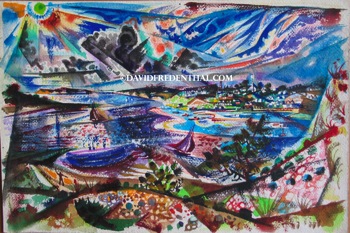—Frederich Nietzsche
The first word that comes to mind as one experiences the work
of David Fredenthal, is life: warm, turbulent, intense convoluted,
aggressive, relentless chaotic life. From the simplest, most
deceptively bucolic, gnarled, and anthropomorphic landscape to
his orgiastic, Byzantine cityscapes, his paintings run hot-blooded
with life. Even when the palette is cool, as it is, ironically, in the
landscapes, Fredenthal is not afraid of the elements or of the streets.
He rushes at them, embraces them, devours them, and finally spits
them out raw and aiive in a myriad of fragmented images that sing
a hymn of praise to life and love. Whether the palette is cool as in
the landscapes, or hot as in the cityscapes, the color is always intense
and luminous, as though cleansed by rain.

The cityscapes in particular have the feeling of large, stained glass
windows: each singular detail at once complex and ultimately simple,
integrates with its equally complex neighboring image to form compellingly
controlled network of interconnecting patterns that mesh to create a whole
in which nothing stands still. The irony being that this beehive is solidly
rooted in Cubism, which is in turn rooted in the deep stillness of the earth.
"Wellfleet Harbor", Watercolor, circa 1952, 12" x 18"
And yet all of his paintings rush to heaven, as he unveils his subject inch
by detailed inch, from every conceivable point of view, and at every possible
stage of growth.
One does not simply look at the Fredenthal painting, as much as someone
is sucked into the very vortex of his intensely emotional world. The entire surface
dances with movement! Nothing rests.
Fredenthal’s paintings harbor the potential for total chaos , but at their heart is
a deep serenity as he wrests order out of seeming shambles. Like Van Gogh,
he does not distinguish between a tiny flower and a large tree, a pigeon is as
critical as a beautiful woman. In a frenzy of paint, he imbues each with humanity,
he gives each a soul. And Like Van Gogh, he saw too much, too clearly, too soon.
The vision was too painful, and the tragedy will always be that the price he chose
to pay for his vision was his life.
Nina Ffrench-Frazier
(Abridged review of Solo Exhibition of David Fredenthal at the Kennedy Galleries,
ARTS Magazine, March 1987, p. 98)